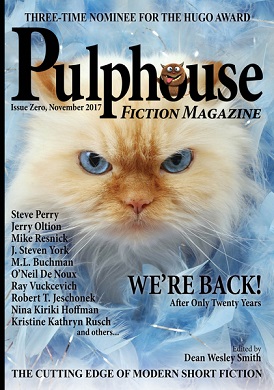 Pulphouse Issue 0, November 2017
Pulphouse Issue 0, November 2017
Reviewed by Chuck Rothman
For a short time back in the 80s and early 90s, Pulphouse: The Hardback Magazine made Eugene, Oregon a center of the genre small press world. Dean Wesley Smith and Kristine Kathryn Rusch started it as a quarterly magazine, published in hardcover, that attracted some of the most imaginative authors in the field. They expanded later, with the (overly) bold idea of doing a weekly SF magazine. Pulphouse never really could keep up that pace, but still published some excellent stories. At the same time, they were publishing single-author collections and reprint series. It was a place where many successful authors got their start.
Pulphouse folded in 1994, having been a bit too ambitious and finding they had over-expanded. Now, Smith and Rusch are working to bring it back, using crowdfunding to put it out in electronic and print formats. Issue 0 consists of reprints from the press’s heyday as a taste of what is in store.
Reading through these, I was impressed by the show of imagination involved. Stories often took bizarre concepts and ran with them without explanation. A prime example is “Spud Wrangler” by Kent Patterson, a story about cowboys—well, I suppose they’re potato-boys—who are faced with danger when their herd of Idaho spuds stampede. The silliness of the concept makes the story a delight to read. Similar weird setups can be found in Nina Kiriki Hoffman‘s “Savage Breasts,” “Jesus at the Bat” by Esther Friesner (who was very involved with the magazine as a columnist) about a supernaturally talented player of little league baseball, and the satisfying revenge story by Steve Perry, “Chrome Bimbos. “A Little Song, A Little Dance, A Little Apocalypse Down Your Pants” by Robert T. Jeschonek tells of a comedian who literally dies on stage at each show.
The stories are all strong (not surprising when you have years of good stories to pick from) and show an off-kilter sensibility that I found very fresh even after all this time. If this is a taste of what’s to come, it’s worth giving Pulphouse a look.
Chuck Rothman’s novels Staroamer’s Fate and Syron’s Fate are available from Fantastic Books. He once sold a story to Pulphouse, though it appeared in one of Dean Wesley Smith’s other projects.